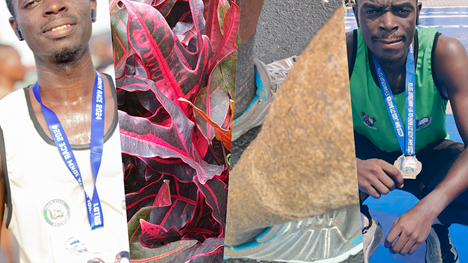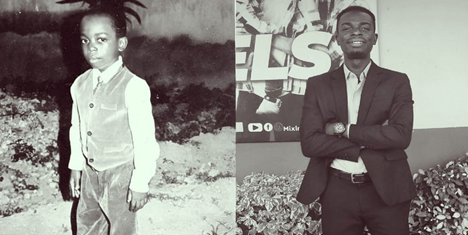What I Have Learned in Almost Two Years of Running

I began running consistently sometime around the start of the 2023 rainy season, approximately two months after my twenty-sixth birthday, which answers the question of when. However, I am inclined to devote the bulk of this essay which I am half-seriously writing and even less seriously promoting whilst on a train to my next adventure, to answering the question of why. Is it not true that the crying child always knows why it is crying, even if it cannot articulate it…? One who runs wildly through a thorn bush also does so for a reason; if they are not after something, something must be after them. When the why of a thing is not known, abuse is inevitable.
I did not start running because someone asked me to; I started running because I wanted to. And sometimes, the reason one starts a thing differs from why one continues it. But this is not supposed to be a philosophical exposition. Instead, I write to consolidate my lessons from several months of running for my reference, and I hope you find it helpful.
I am a serious runner, not a professional runner, but a serious, recreational, largely private, and sometimes public runner. And unless it is unavoidable, such as when I embark on trips without my running shoes, I run every day. But before running, I was happy to let my feet do the talking with long, mostly evening walks. I was in my final year, knee-deep in what is arguably the most challenging undergraduate course in existence when I discovered this. I figured very early in life that I was not a weak person by any explanation, and I have always considered myself idealistically aspirational. However, schooling pressures sometimes blurred the sharp edges of whatever I had to myself that I could truly call my life.
I did not come up in the small Ethiopian town of Bekoji, where the earth itself seems to shape runners, where a handful of souls have carried home gold medals, shattered world records, and stamped their names onto history with the rhythm of their own feet. Nor have I ever lived in Jos, Plateau State, where the air is thin, the hills are high, and the runners rise with the sun, chasing something greater than themselves. I did not grow up in a place where people hit the pavement for fun. Instead, what inspired me to start running was purely a matter of responding, rather than merely reacting to stress.
“But is not running itself a stressful thing? Where is the sense in all of that?”
What I tried to do was combat post-traumatic and excessive acute-on-chronic schooling and training stresses with a more meaningful kind of stress, the kind that I had more control over. I love road running. And whether it loves me back does not matter much to me.
Running was not my first love when it came to sports. For the better part of my twenty-eight years, I loved soccer more than I did running. I played with all kinds of balls: sachet water (nylon), plastic, socks, rubber (fẹ́lẹ̀lẹ̀), and leather (health and tanko) balls. I do not intend to flatter myself when I say I have at least an impressively average ability in maneuvering a football. But I outgrew this beautiful team sport, or maybe it outgrew me.
I was testing the waters when I began running — only trying to get stronger. Everything I did was in response to stress. I walked a lot and then would run a mile from my hostel to the hospital gate — a distance of approximately 1.6 km. After about a week, I started entertaining the idea of making a U-turn at that 1.6 km mark and running back to my hostel, which would make it a distance of over 3 km. I continued this despite my daily workload as a student and the continuous assessments (in-courses) in dental school.
Then, after a while, I began to do a daily 5 km. About two months after that, I began to run 10 km to the Obafemi Awolowo University main campus gate. Those runs knocked the wind out of me the first few times, and I would spend the rest of my Saturdays peacefully in bed, hugging my mostly peaceful thoughts. While I was still in school, I ran the half-marathon a few times and completed the 30 km at least once. I ran on in-course days and ran on the day I was inducted into the medical and dental profession. Will I run on my wedding day? I do not now know. But if I do not end up doing it, it will not be for a lack of giving it a thought or two.
Every once in a while, I love being on my own. Some say that is solitude, but I do not care highly what it is called. I think it is impossible to live a reflective life without striking that crucial balance between public and private life. Running allows me to be on my own and with my thoughts. It gives me room to breathe and chew things over. My post-run routine consisted of taking lots of walks, hydration, and eating as well as I could. I would take the controlled stress that sometimes resulted from my workouts over everything else. I had control over my routines. And that was worth more than anything in the world to me.
Consistency, variety in training, recovery and rest, appropriate nutrition and hydration, using fitting gears, and maintaining a proper form and posture are some of the basic principles of running. And they are easy to master. Running is simple. It requires no partner, no team, no elaborate machinery — only the will to move and a road that will take you. It does not ask for a court, a pool, a net, or a course sculpted by careful hands. It is, in its essence, freedom — just a pair of good shoes and the open world before you. But for all practical purposes, it helps to remember that unless one’s legs have the power of a cow’s hooves, a pair of good running shoes is key.
I have no strong opinions on whether outdoor runs are better than treadmill runs, though I think a good combination of the two makes a great deal of sense. Also, if I had to choose between aerobics and strength training, I’d choose the former. But wisdom, as always, lies in harmony — the push and the pull, the sweat and the strength, the endurance and the power, each feeding the other, each necessary to the whole.
My first competitive race, the 2024 Lagos City Marathon, was an epic train wreck. I was a bit anxious and had registered for a 42-kilometer race — exactly the type of anxiety-inducing race a first-timer like me did not need. I cannot now remember what my pacing strategy was if I had any, but it was ultimately unnecessary, as I was able to finish only after an elapsed time of 5:17:00. I made far too many mistakes.
First, my pre-race diet was inadequate. A night of good sleep is a requirement for a successful race and so is an awfully good diet, especially forty-eight to seventy-two hours before the event. Soda was served at rest stations — the kinds of drinks that dehydrate and tire especially when consumed early in the race. I started drinking them at 10 km, which was a mistake. I should have stayed on the other side of the rest stations on the road — that way, perhaps, I would not have been tempted to stop as much as I did.
There was also a psychological aspect to the race: once I began to permanently — emphasis on “permanently” — allow the behaviors of other runners to affect me, it became a real downside. But I learned that it helps to focus on endurance and not speed. I should have kept it conservative. Additionally, slowing down to walk or rest should be at least beyond the half-marathon distance for a full marathon race (if one intends to stop at all). And a good distraction — whether a song on repeat, a playlist, or an audiobook — might help. You may not need it, but you will never know. Lastly, I learned there is zero wisdom in testing new gear at an official race.
During my housemanship training at Federal Medical Centre, Abeokuta, I kept up with my workouts. It was the first nine-to-five I would work, and I was curious to see how I would balance the workload with my workouts. It turned out impressively. I ran more consistently, and the results were pretty great. I met some interesting people on my runs. I would sometimes see the same people every morning for weeks, and then they would disappear. I wondered what happened to them. Life? Maybe. I passed by a morgue frequently and it would remind me of the inevitability of death. Sometime towards the end of the 2024 rainy season, a senior colleague shared the Abeokuta 10km Road Race with me. They encouraged me to register and run the race. I did and finished in 40 mins and 4 seconds.
Since I began this essay, I have run my second full marathon, a sub-4 hour marathon which I completed at an elapsed time of 3:57:32.
Running has lots of benefits: spiritual, mental, and emotional (believe me, depression hates a moving target), and physical. I wish to write about the spiritual benefits of running first because I believe I am a spiritual man having a human experience. What makes this possible is the connection of my spirit with my body by my soul — the seat of my mind, will, and emotions. Now, running is a time to pray and communicate with the Godhead, helped by the Holy Spirit. And so it is no surprise that when I pray while running, I do not waste my words. It is my daily reminder that helped by my Creator, I have the power to change whatever circumstance I am in for the better.
Running builds resilience and antifragility. It builds grit and toughens you up in all the right ways. It teaches suffering, and the ability to carry on even when the weight of the world sits heavy on my chest. It is a unique type of rebellion against despair. Neurogenesis from running occurs in the prefrontal cortex — the region of the brain linked to stress resilience, learning, and memory. Those who handle stress well show more activity in the left prefrontal cortex. Engaging in hard physical challenges, such as running, strengthens this area, improving cognitive function and delaying age-related decline. It is the ultimate, long-term, keystone habit.
Mentally and emotionally, running allows me to reflect on my challenges and the ways I might positively work through them. It raises my pain threshold. Some days, after my morning workout, I feel invincible — certain that nothing I face for the rest of the day will be as physically demanding. That kind of confidence that makes a young person want to take on the world. Running reduces both state and trait anxieties and improves attentional focus. It enhances executive function. It is said that in people who are regular runners: the absence of running can inhibit creative functions much more than its presence can improve them — an implicit warning to not stop running if you are already a runner. As for the timing, the morning might be an ultra-efficient time. For me, morning runs help me incorporate all the benefits of running into my days. Having runs of different lengths, intensities, and settings within each week also helps free me from the subconscious expectation trap that all my days are supposed to be the same.
Running lifts your mood. It is a surefire way to lift your spirits, but what is the secret sauce? Most assume the answer is endorphins, but the reality is more complex. Exercise raises baseline dopamine, much like sex does, and triggers a cascade of other feel-good chemicals — serotonin, oxytocin, and endocannabinoids — all working together to enhance mood. During the first running boom in the 1970s, many believed that post-run endorphin spikes were the key to the so-called runner’s high. But endorphins are released by the pituitary gland and circulate outside the brain. Instead, endocannabinoids, particularly anandamide, play a major role in the phenomenon known as runner’s high. Unlike endorphins, which struggle to cross the blood-brain barrier, anandamide is small and lipid-soluble, allowing it to enter the brain easily and directly influence mood. I suppose this is also partly what makes it possible to build an unstoppable rhythm during the long run.
Countries like the United Kingdom, Netherlands, and Canada recommend exercise (not necessarily running) as a first-line treatment for mild to moderate depression. In Canada, it is the primary treatment for mild to moderate cases and a supplement for severe ones. Australia and New Zealand treat exercise as step zero — the first prescription before medication or therapy.
From a physical standpoint, running is a powerhouse for cardiovascular health. It strengthens the heart, improves circulation, and lowers disease risk. Over time, it makes the heart more efficient, lowers resting heart rate, and balances cholesterol by lowering LDL (bad cholesterol) and raising HDL (good cholesterol), while also improving insulin sensitivity and reducing inflammation. Runners are believed to have a significantly lower risk of heart disease, making running a key tool for lifelong heart health.
Among famous outdoor runners — Malcolm Gladwell, Mark Zuckerberg, Jack Dorsey, and Will Ferrel to mention a few, — Haruki Murakami is my favourite. I read the Japanese author’s running memoir sometime in 2023 and was struck by how honestly he wrote about his motivations and challenges. I also was impressed and motivated by his determination to integrate running into the different phases of his life.
People often make comments about my habitual running, and not all are helpful. For instance, I have been told about how I would naturally stop running once I add more responsibilities — marriage, children, and a busier career. It matters nothing to be derided as long as one knows what one is doing and why. I hope to build a family, run companies, and write while I keep running in my life. I have seen adult runners and I believe running can be part of my long-term future. I hope to be able to say to my kids one day, “Come jog a few miles with me.” Fortunately, for every discouraging remark, I receive plenty of encouragement. And Strava, the workout app, has been a great online community.
Starting outdoor running is like embarking on any new adventure: one must begin and improve. To be a runner, you just have to run. Running is sometimes about knowing when to run fast and when to slow down, and it is sometimes about who slows down the least, not who runs the fastest. Forget about not having the perfect gear. You can get those in a day. What you cannot do in a day is become the type of runner who wears the perfect gear and produces the perfect performance with discipline.
That said, overrunning and injuries are real concerns. Excessive running can strain the heart, particularly in those with pre-existing conditions. Overtraining syndrome may cause irregular heart rhythms or cardiac scarring, though this mostly affects professionals. Running outdoors also carries the risk of falls, traffic, or personal safety concerns in certain areas. The key is to plan your workout around your life and not plan your life around your workout. This principle especially applies to those who take outdoor running recreationally. If you are predisposed to any condition or currently managing one, ensure that you do regular medical check-ups and speak with your doctor.
Outdoor running in Africa is still in its infancy due to inadequate infrastructure, safety concerns, and a lack of motivation. And there are lots of best practices that will only be unveiled here in the decades when better infrastructure is in place.
The reason I started running differs from why I chose to continue it. Now, I think I mostly run to live life to the fullest. Someday, I will no longer be able to run, and I will be like those cadavers I would see along the morgue road. Heavens, my body will go under the same ground on which I now regularly run someday! But that day is not today. And for that, I thank the powers that be.
NB: This essay is not intended as a substitute for medical advice on any issue, physical or psychological.



